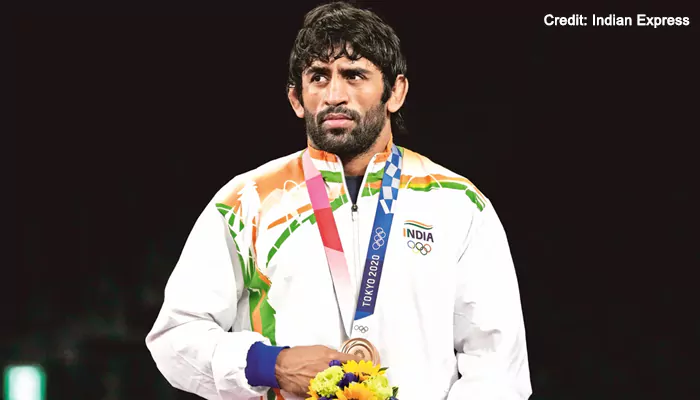
A tale of grit, injury, and the unbending will of a champion in India’s wrestling legacy
In August, the month when the nation celebrates its freedom, we also reflect on the moments that reaffirm our belief in perseverance. Among these is a night in Tokyo when a wrestler from Haryana — carrying an injured knee, the weight of expectations, and the stubborn will of a fighter — wrestled not just an opponent, but pain itself, to win an Olympic bronze.

Credit: The Bridge
Bajrang Punia was no stranger to pressure. As a world number two in the 65kg freestyle wrestling category, he was considered a serious contender for gold at Tokyo 2020. But fate had its own plans. Just weeks before the Games, in the semi-finals of the Ali Aliyev tournament in Russia, he sustained a right knee injury.
The injury kept him from full training on the mat for nearly a month. When he finally arrived in Tokyo, his right leg was heavily strapped — more armour than support. Every step on the mat carried the risk of worsening the injury. Yet, for Bajrang, retreat was never an option.
His early bouts in Tokyo showed an unusually defensive approach. “We tried to avoid risk in the initial matches,” he later admitted. The plan was straightforward — survive, progress, and protect the knee for the medal matches.
That caution helped him reach the bronze medal play-off against Kazakhstan’s Daulet Niyazbekov. But this time, Bajrang decided the strapping had to come off. “The medal was more important; injury could be treated later,” he said. It was a gamble — and it paid off.

Credit: NDTV
Under the bright lights of Makuhari Messe Hall, Bajrang looked like the wrestler the world feared. Agile, aggressive, relentless — he dominated Niyazbekov with an 8-0 scoreline, leaving no doubt about his superiority. The bronze around his neck was a victory not just over his opponent, but over the pain that had threatened to derail his campaign.
This achievement placed him alongside an elite list of Indian Olympic wrestlers — from K.D. Jadhav in 1952 to Sushil Kumar and Sakshi Malik — each medal, a chapter in India’s post-Independence sporting story.

Credit: reservemystar
Tokyo was not Bajrang's first taste of the podium. By then, his résumé already sparkled:
Gold at the 2018 Commonwealth and Asian Games
Silver at the 2018 World Championships
Multiple Asian Wrestling Championship medals
Two World Championship bronzes (2013, 2019)
From the mats of rural Haryana to wrestling arenas around the globe, his career has been defined by stamina, skill, and a stubborn refusal to give up — traits that shone brightest in Tokyo.

Credit: First Sport
For Bajrang, Tokyo’s bronze was more than personal glory. It was a tribute to the countless hours of sweat shed in training, the sacrifices of coaches and family, and the belief that sport is a form of service to the nation.
In a month when we commemorate those who fought for India’s independence, Bajrang’s story reminds us that courage comes in many forms — sometimes it’s in the ring, sometimes it’s on the mat, and sometimes it’s in refusing to walk away when your body urges you to stop.